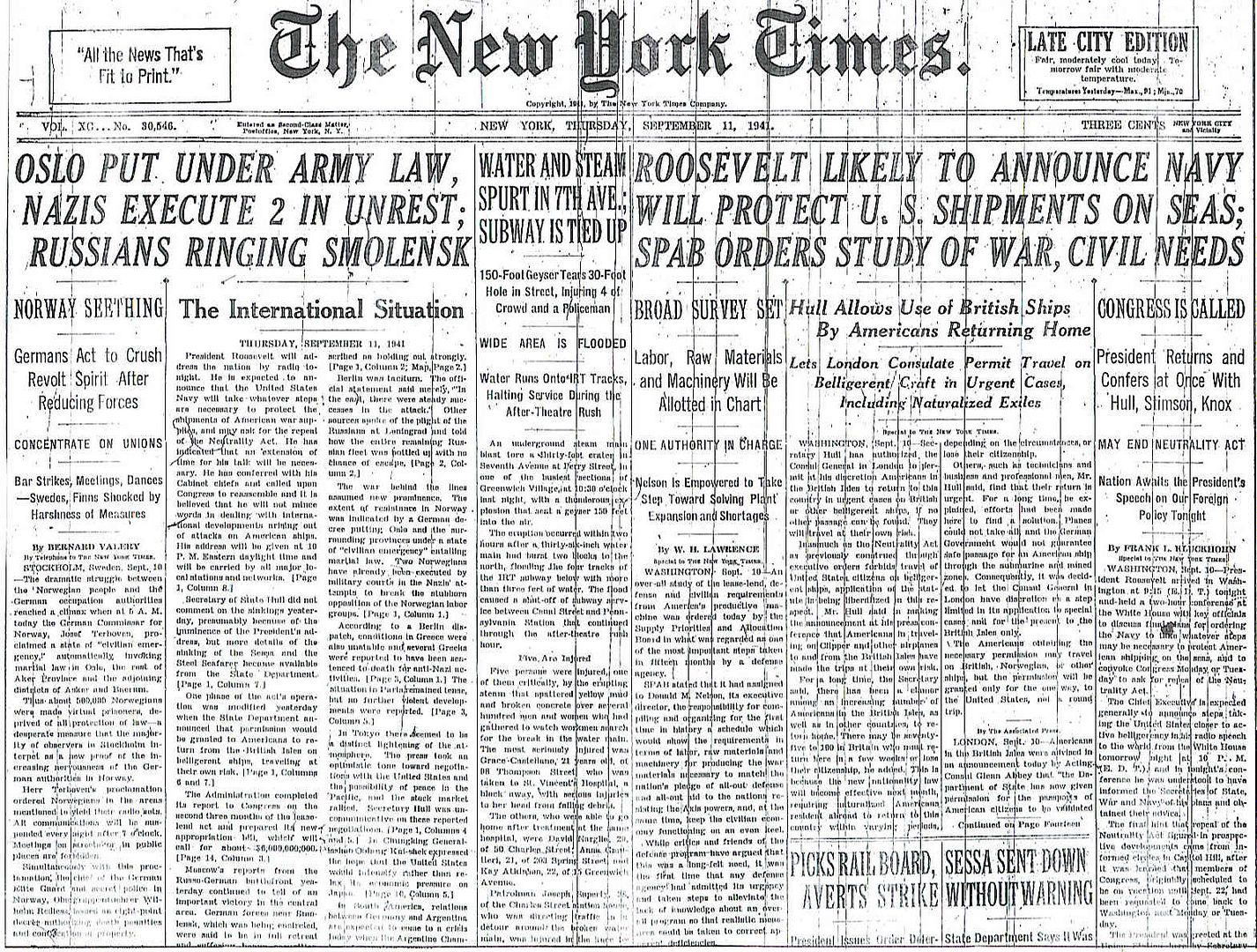
Posted on 09/11/2011 6:02:01 AM PDT by Homer_J_Simpson

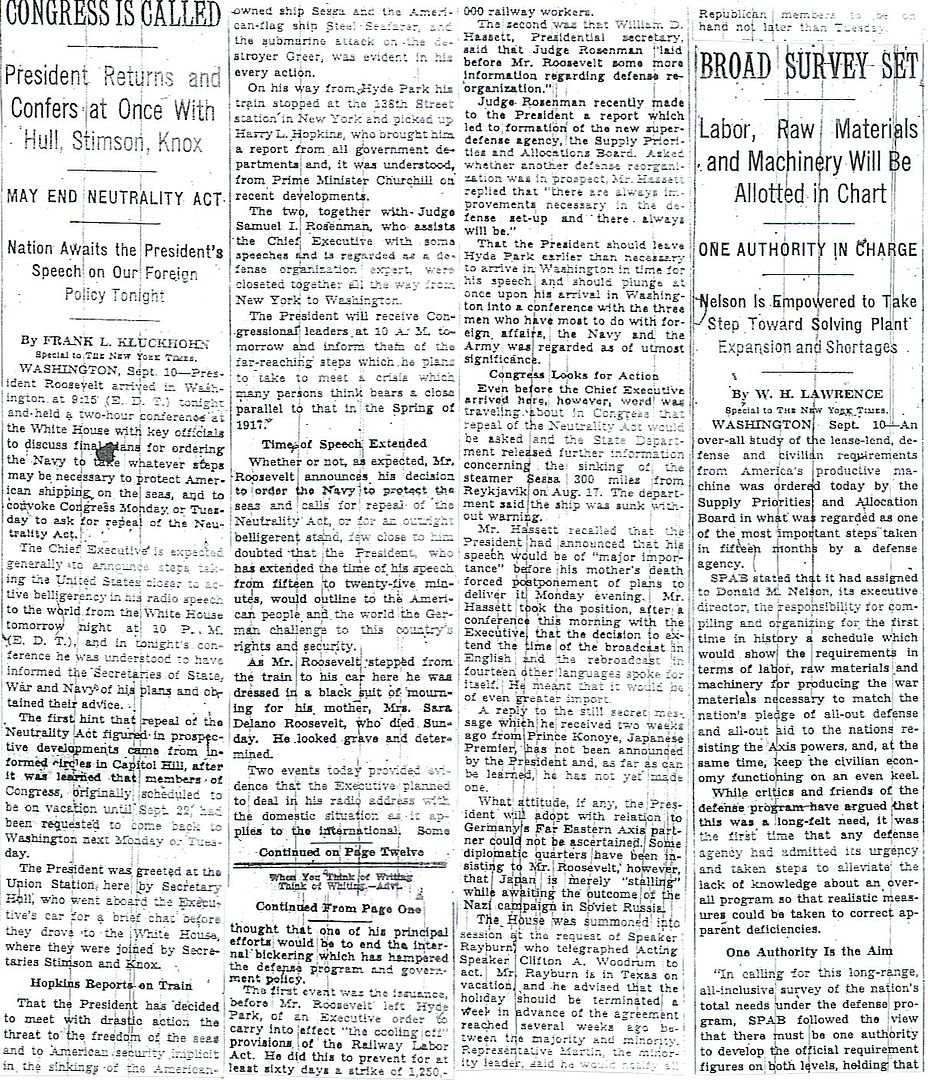
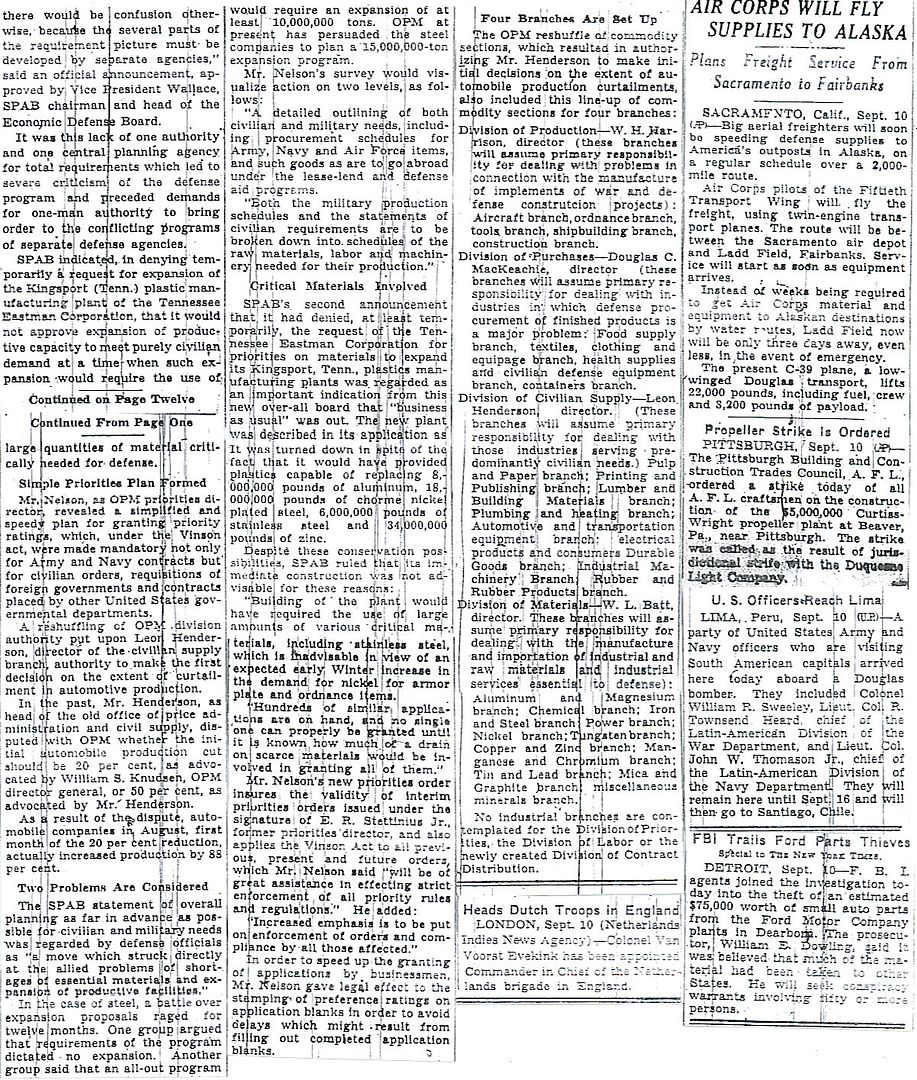
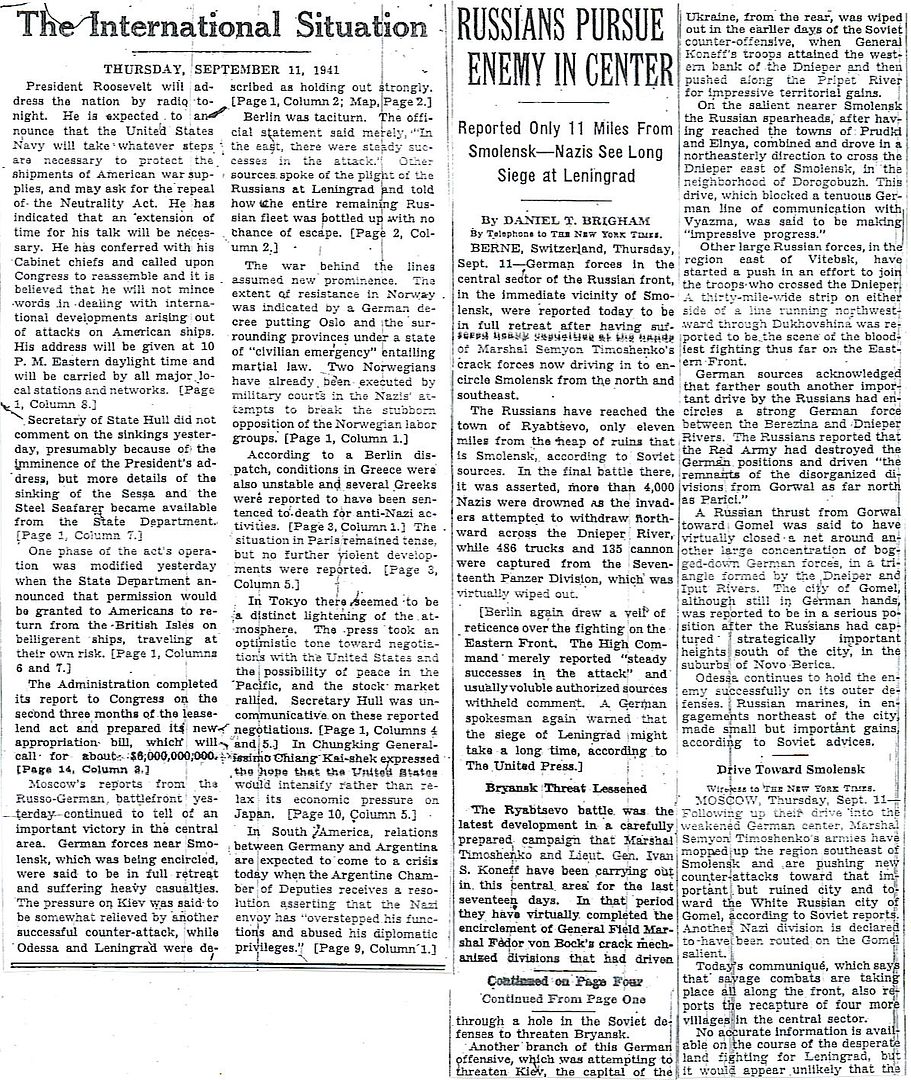
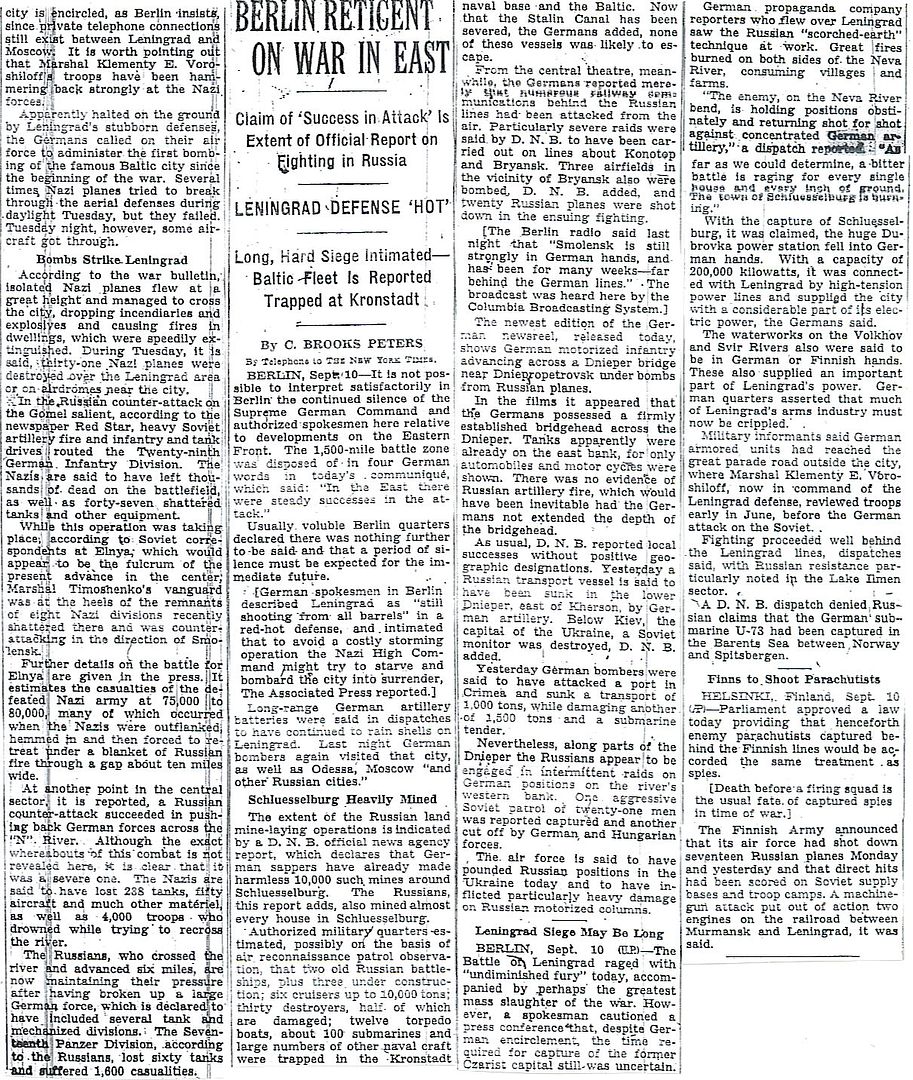
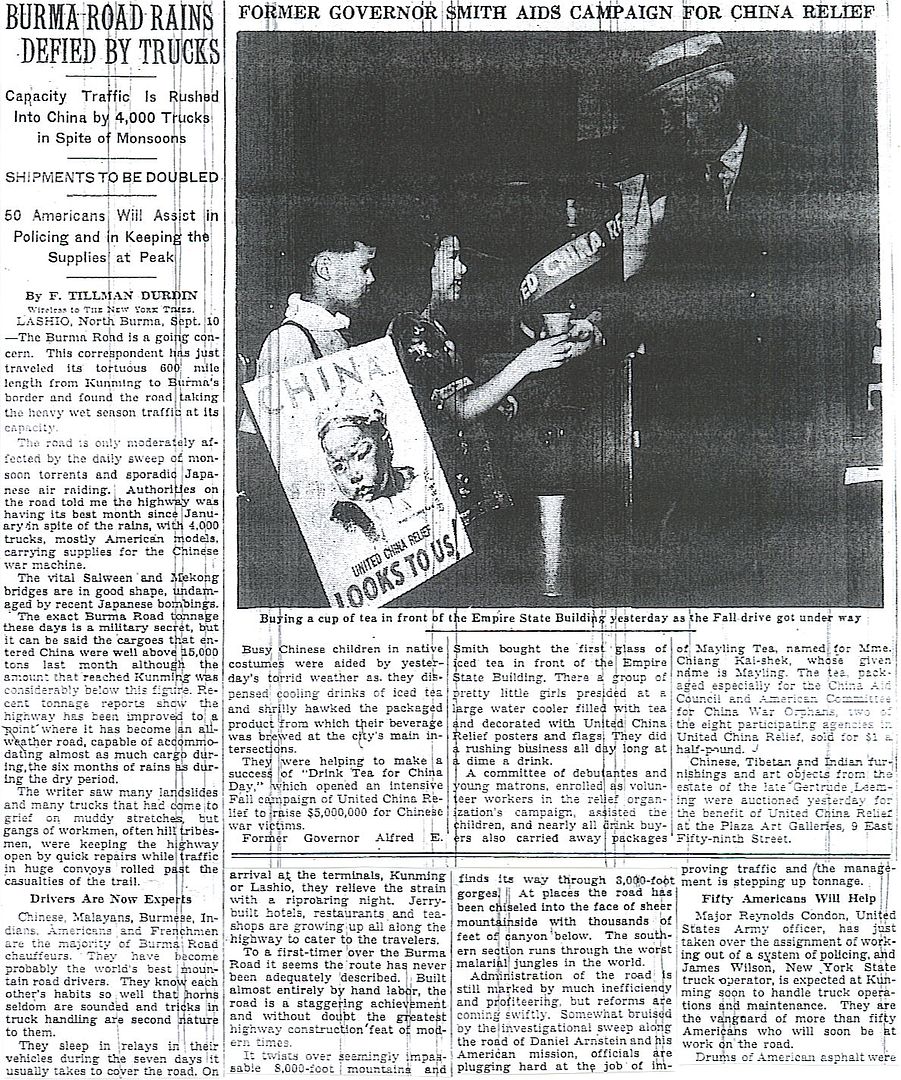
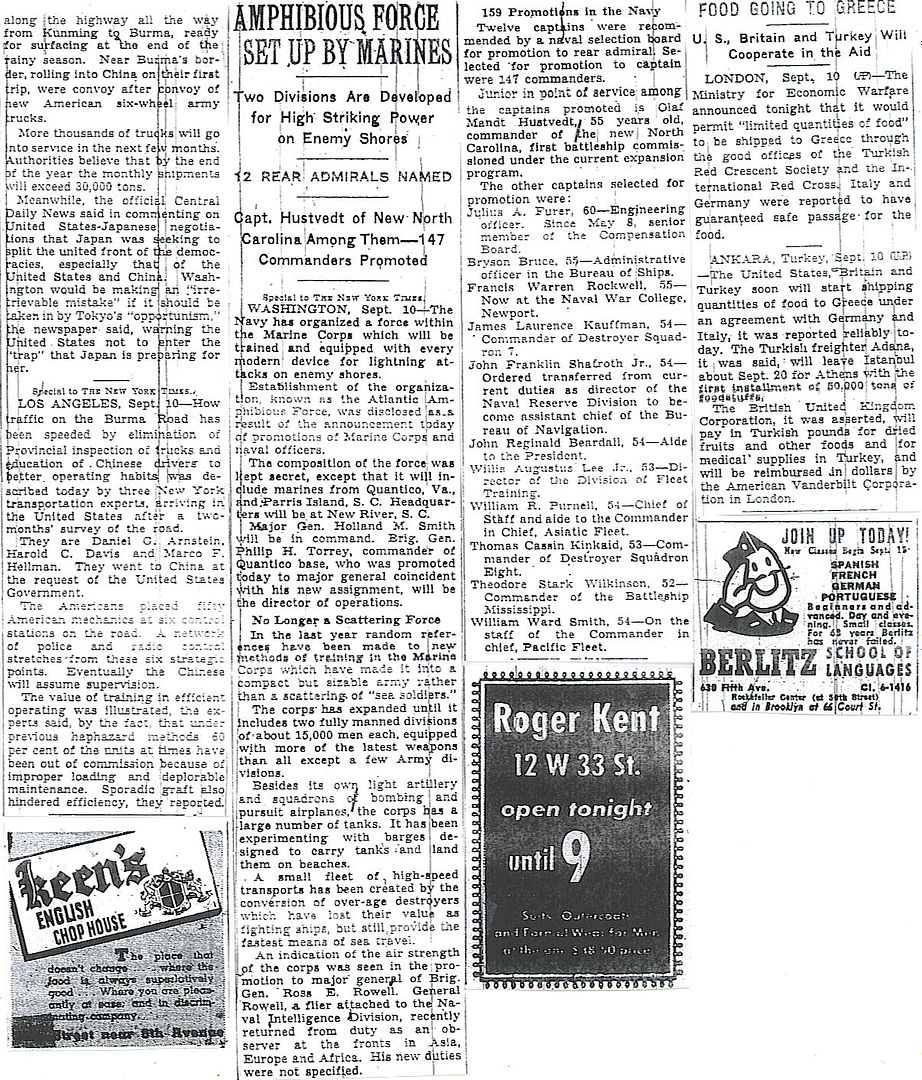
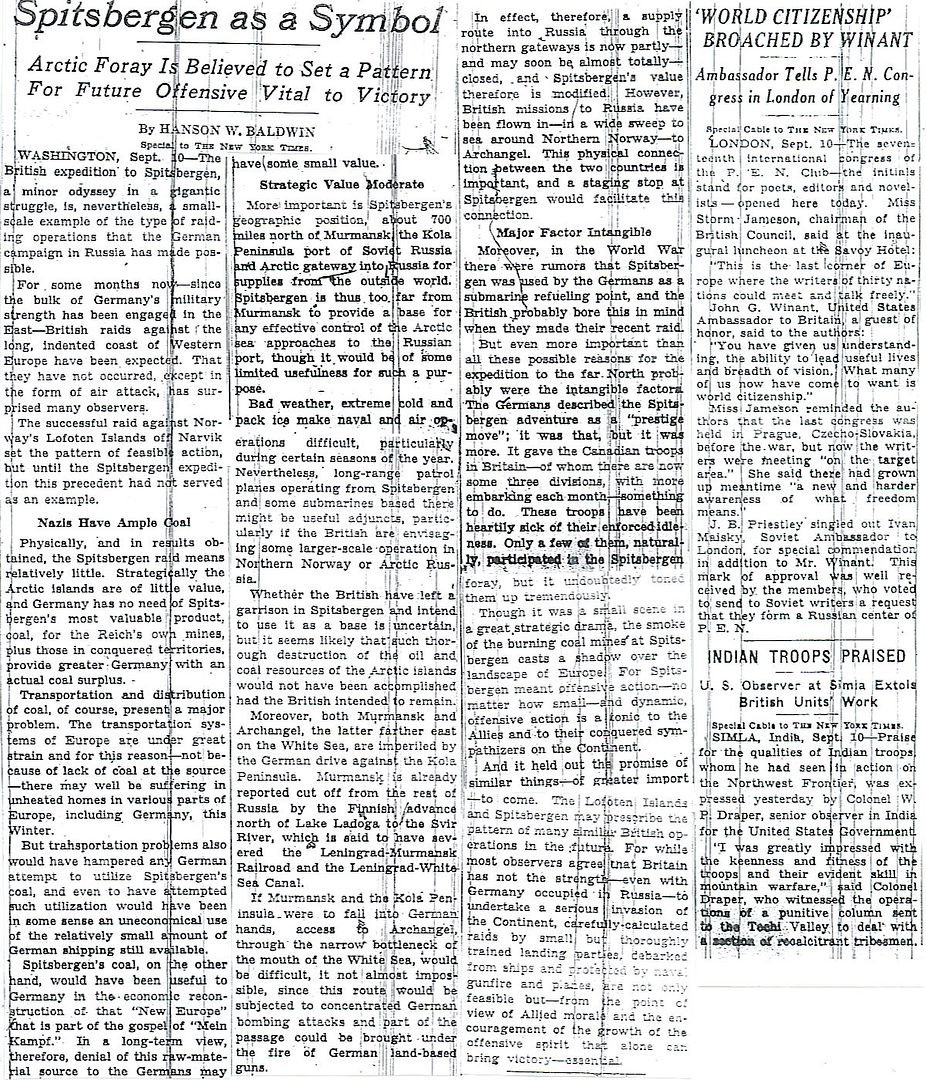
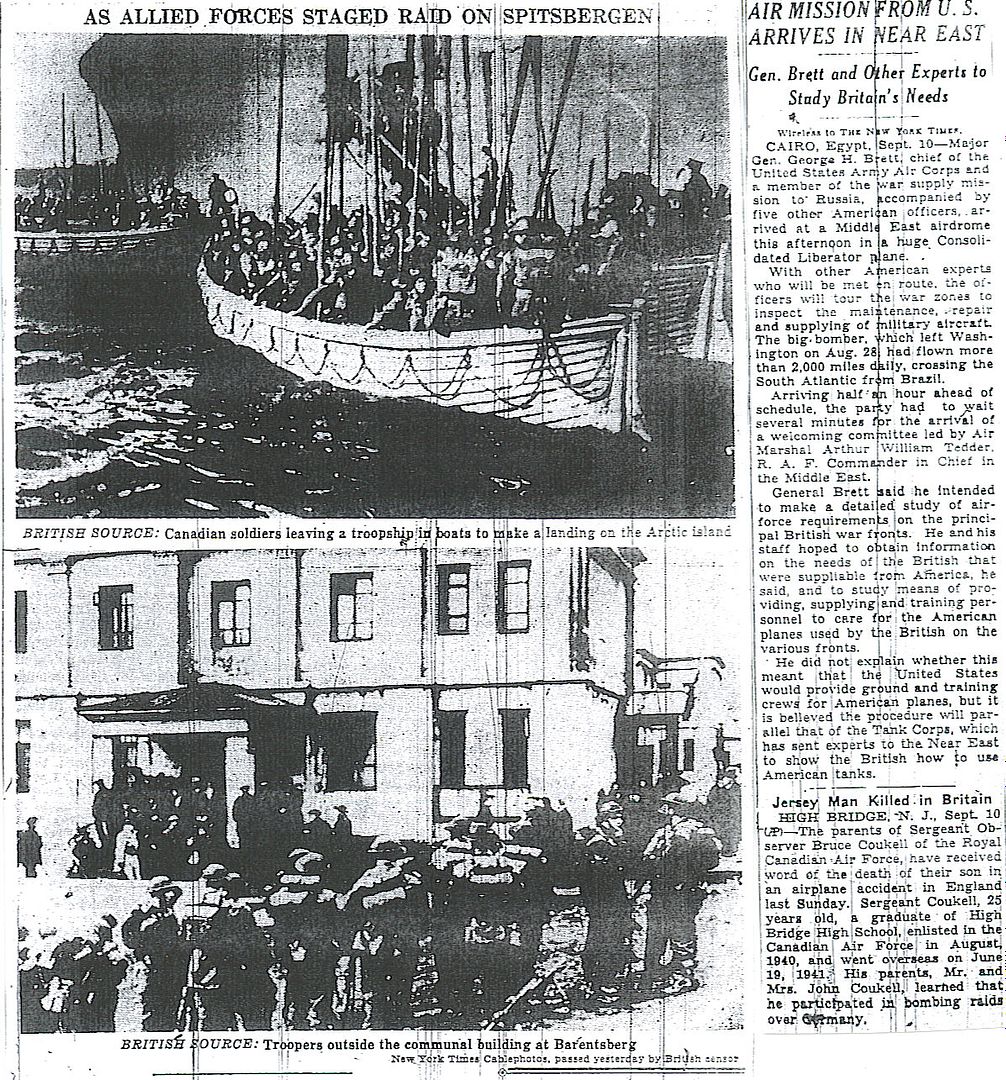
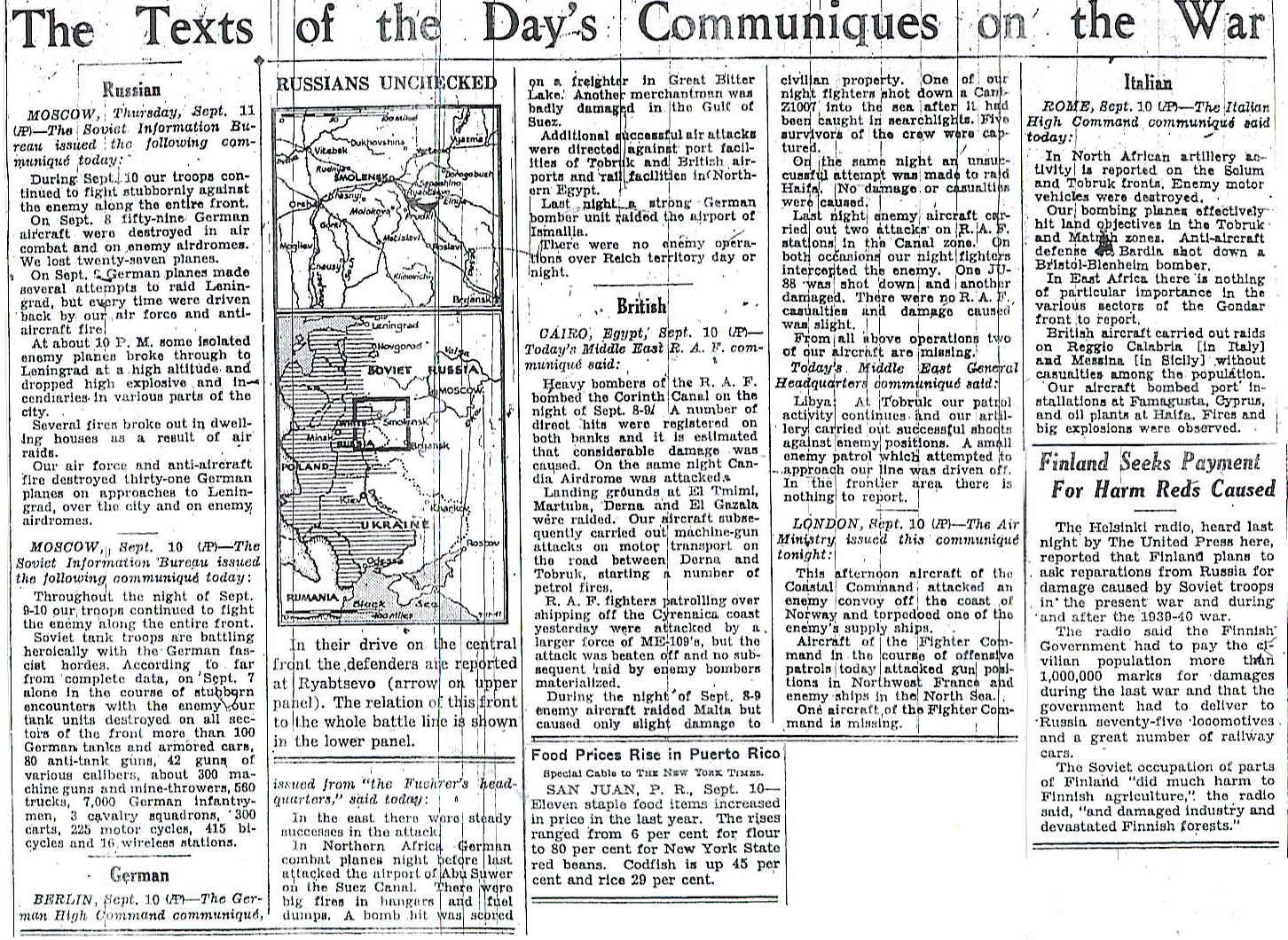
Congress is Called – 2
Broad Survey Set – 2-3
Air Corps Will Fly Supplies to Alaska – 3
The International Situation – 4
Russians Pursue Enemy in Center – 4-5
Berlin Reticent on War in East – 5
Burma Road Rains Defied by Trucks – 6-7
Former Governor Smith Aids Campaign for China Relief (with photo) – 6
Amphibious Force Set Up by Marines – 7
Spitsbergen as a Symbol (by Hanson W. Baldwin) – 8
‘World Citizenship’ Broached by Winant – 8
As Allied Forces Staged a Raid on Spitsbergen (phtotos) – 9
Air Mission from U.S. Arrives in Near East – 9
The Texts of the Day’s Communiques on the War – 10
http://www.onwar.com/chrono/1941/sep41/f11sep41.htm
US warships to “shoot on sight”
Thursday, September 11, 1941 www.onwar.com
From Washington... As a result of public outrage over the Greer incident, the president announces that American warships will be able to “shoot on sight” to ensure the protection of waters “necessary for American defense.” This formalizes a situation which has been commonly occurring.
The Andrew Etherington page is unavailable at the moment. I will check back later and post it when I can - Homer.
"German soldiers confront a Jewish woman in a Bessarabian transit camp.
Many Jews were killed as a result of Romanian leader Ion Antonescu's decree Curatirea Terenului (Cleansing of the Ground).
Those who survived were relegated to primitive camps with grass huts, like the one pictured here, or to crowded ghettos."
He declared war in all but in name?........ ........... We were in it. If we were escorting convoys or even sailing among them, we made our ships targets. Roosevelt probably didn’t want to go to war, he had a depression to get out of, and having the other sides do the fighting and us doing the providing of equipment, he was safe. Our war production for the Brits and Russians got this country going economically.
We played around in the convoys to Britain, there was a German blockade zone in the North Atlantic. The Germans attacked 3 ships of ours during 1941, the Greer, Kearny and Rubin James, all were attacked in the German Blockade zone where ships were taking supplies to England. Was it necessary for us to go there? We gave the British 150 destroyers. Our presence in there was an act of undeclared naval war in the eyes of the Germans. 6 weeks after the Rubin James was sunk, it no longer mattered, we were officially in it, thanks to Pearl Harbor and Hitler’s dumb ass declaration of war against the USA. The result, our unemployment figures went way down, 14 million guys got a Government shovel (for fox holes) job with fun, travel, and adventure. Women took over the jobs that were held by men on the production line and the depression years came to an end.
Ironically, had the Japanese Navy not inflicted such heavy damage to the battlewagons at Pearl Harbor, the US Command would have likely stuck to the War Plan Orange/Rainbow 3 Plan, which would have been a disaster.
The relief of the Phillipines with the entire fleet, with the Battleships leading the way, facing the entire Japanese fleet and ground based air in the “Decisive” Battle in the Phillipine Sea in Jan/Feb 1942 would have been a bloodbath for US Forces...
It was a corner of Europe rich in history. Two hundred and thirty-five years before Harry Hoppe, Peter the Great fought a battle here in order to take from the Swedes the key to the Baltic Sea. He succeeded. For the first time the Tsar of Russia gained for his country access to Europe's most important inland sea, and to protect this conquest he founded the fortress of St Petersburg, now Leningrad. It was that fortress that was being fought for now at Schlüsselburg.
Under cover of this flanking operation the combat groups of Colonels Count Schwerin and Harry Hoppe, with their reinforced 76th and 424th Infantry Regiments, were to reach the starting positions for an assault on Schlüsselburg by 8th September 1941, the day for which the large-scale attack on Leningrad had been fixed—Hoppe's combat group on the right and Count Schwenn's on the left.
They went into action on 6th September. At first everything went according to plan. Tanks of 12th Panzer Division supported the attack. Panzerjägers and AA batteries—including an 8.8—provided cover against enemy tank attacks. Motorcyclists and sappers formed the vanguard.
The main weight of the attack was in the sector of Hoppe's group. The I and VIII Air Corps provided Stuka support. The troops charged over the famous railway embankment of Mga. They burst into the forest along both sides of the road to Kelkolovo. But there the Russians were waiting for them in well-camouflaged machine-gun and anti-tank positions.
The attack got stuck. Infantry guns, anti-tank guns, and mortars were not much use in this wilderness. Colonel Hoppe was crouching by the railway embankment. A runner from 3rd Battalion came scurrying over the line. "Heavy casualties at Battalion. Three officers killed." Calls for support also came from 2nd Battalion.
"We've got to find a gap," Hoppe was thinking aloud, bent over his maps. "The Russians can't be equally strong everywhere. It's just a matter of finding their weak spot."
Hoppe's idea was either to probe the enemy's weakness by a frontal attack or to outflank him altogether. He combined in himself the dash of a First World War assault troop commander with the sound tactical instruction received in Seeckt's Reichswehr.
The runner scuttled off again. Major-General Zorn appeared at the command post. He no longer believed in the possibility of forcing a break-through in Hoppe's sector. He therefore dispatched the tanks over to Schwerin's group. That was where the main push was now to be made.
But it proved to be a case of a general proposing and a lieutenant disposing.
No sooner had the tanks been withdrawn from the line than Second Lieutenant Leliveldt, with his 11th Company, discovered the looked-for gap, the weak spot in the enemy's line. He thrust into it, applied pressure to the right and left, and tore a wide breach into the front.
"Buzz over to Harry," the Second Lieutenant shouted at his runner. "We've got the gap. The front is open!"
The runner raced off. Half an hour later the entire combat group was moving. Kelkolovo fell. The notorious rail-track triangle formed by the line from Gorodok to Mga and Schlüsselburg was taken and Poselok 6 was stormed.
At 1600 hours Sinyavino with its huge stores and ammunition depots fell into the hands of 3rd Battalion.
From a small hill north of the town the vast sheet of water of Lake Ladoga could be seen and a light sea-breeze felt. There was a good deal of shipping on the lake.
"Keep going,'' Hoppe commanded.
His men took Poselok 5 and moved on as far as Poselok 1. From there the "Red Road" led to the "Red Bridge" over the canals and coastal railway-lines. This was the spinal cord of the Schlüsselburg nerve centre.
Night fell over the battlefield. From Sinyavino a gigantic fireworks display lit up the sky: some Russian ammunition dumps had been hit and were now going up. Unfortunately the vast explosions also wrecked the combat group's communications with Division.
On the following morning, 8th September, Schlüsselburg was to have been stormed. But at what time? Hoppe did not know, since Division was going to co-ordinate the time of attack with the Stuka formations. But now, with communications out of action, there was no contact with divisional headquarters. It was an awkward situation.
Over to the west, at Leningrad, the Corps launched its general attack at first light on 8th September. But in Schlüsselburg everything remained quiet. When the sun rose the town with its pointed spires and massive old ramparts lay in front of Hoppe's battalions. The shrub-grown ground favored the attack. But there was still no contact with Division.
The 9th Company made a reconnaissance in force as far as the eastern edge of the town. At 0615 hours Sergeant Becker reported to 3rd Battalion: The eastern edge of the town is held by weak enemy forces only. Clearly the Russians were not expecting an attack at this point, from their rear. It seemed a unique chance.
Hoppe was in a quandary: should he attack or not? If he stormed the town and the Stukas did not come until his battalions were inside, the consequences were not to be imagined.
But he could not just sit there waiting. To wait without doing anything was the worst thing of all—that was what the Service manual said. Better a wrong decision than no decision at all. Hoppe decided accordingly.
Shortly before 0700 hours he ordered: "The 424th Regiment will take Schlüsselburg and drive through to the 1000-yardwide Neva river, at the point where it leaves Lake Ladoga, dividing Schlüsselburg from Sheremetyevka and the southern bank of Lake Ladoga from its western bank. Time of attack is 0700 hours." Harry had made his plan.
At 0730 hours the battalions were bursting through the weakly held eastern fringe of the town. The Russians were thrown into confusion by the unexpected attack.
At 0740 hours Sergeant Wendt hoisted the German flag over the tall steeple of the church. Ever since the start of the attack Second Lieutenants Fuss and Pauli had been sitting in front of their walkie-talkie transmitter, trying to make contact with the nearest heavy battery, at Gorodok. It might be possible to re-establish contact with Division HQ through them. Fuss had been talking into his microphone ceaselessly for three-quarters of an hour. Calling—switching over to receiving —calling again. Nothing happened.
"Suppose we don't get through? Suppose the Stukas come?"
At last, at 0815 hours, the battery at Gorodok responded. They had been heard. "This is Group Harry. Urgently pass on to Division: Schlüsselburg already stormed. Stukas must be stopped. Have you got that?"
"Message understood."
The battery officer immediately passed on the signal. The Stukas had already taken off because Hoppe's attack had not been scheduled until 0900 hours. Most of the machines could be recalled. But one squadron had gone too far for the new order to reach it. Via the battery at Gorodok a signal was sent to Hoppe to warn him of his danger.
At 0845 exactly the JU-87s appeared in the sky. Hoppe's men waved aircraft signaling sheets. They fired white Very lights:We are here.
Would the pilots see them? Or would they think this was a trick? Their orders were to bomb Schlüsselburg.
The Stukas banked steeply—neatly, one after another. But suddenly the first one leveled out again, roared on, and dropped its bombs into the Neva. The others followed suit. At the last moment a signal from the squadron commander had reached them. Harry Hoppe and his men heaved a sigh of relief. At 1000 hours the battalions of combat group Schwerin also moved into the southern part of the town.
The conquest of Schlüsselburg meant that Leningrad was sealed off to the east. The city now was an island surrounded by troops and water. Only a narrow corridor was still open to the western shore of Lake Ladoga, because the Finns in the Karelian Isthmus were still standing by. They were waiting for the Germans to drive past Leningrad to Tikhvin. Only then did Mannerheim intend to drive along the eastern shore of Lake Ladoga, across the Svir, and thus form the eastern prong of the pincers closing around a huge pocket with Leningrad in it. That, unfortunately, proved too ambitious an objective.
Continued tomorrow: Soviet Reaction
This is also the day that Charles Lindbergh gave a speech for the America First Committee in Des Moise, Iowa.

German soldiers of Grossdeutschland search for fleeing Soviets near Moscow-Nov 1941
German panzers before an attack-Ukraine summer 1941
Heavy German PzKw. at a narrow bridge trying to drive over with a chain- slipped off the road. It is pulled by a second heavy tank to the rear of the bridge. When pulling through the second heavy armor breaks the bridge railing July 1941
Two soldiers in the Luftwaffe in a dugout in front of furnace with eating utensils
Woman and daughter on street of a German occupied city in the Soviet Union.
Column of German tanks-Army Group Center around Oct 1941
Inside a Panzer IV-Oct 1941
German pickets keep watch east of Smolensk guarding a highway. Aug 1941
Supply column halts to examine Soviet tank on the side of the highway-east of Minsk Aug 1941
Two Soviet T-34/76B tanks lie abandoned on the steppe east of Kiev Sept 1941
German cemetery off the Kiev highway in July 1941
German Panzer troops cross an anti-tank ditch east of the Dneiper river during the Kiev encirclement-Sept 1941
Hitler meets with von Bock at Army Group Center's headquarters on Aug 4th, 1941.
The commander of the 11th Panzer division Major General Ludwig Cruewell in the Ukraine in July 1941 (German photo captured by Soviets)
The commander of Panzer Group 2 Colonel General Guderian having a discussion with Panzer Corps commander Lieutenant General Walter Model August 1941 (German photo captured by Soviets)
German flak troops say goodbye to a comrade-Oct 1941 near Vjasma.
Hitler & Mussolini on visit to the East front-Summer 1941
A 47mm Pak 181(f)AT gun from the 17th or 18th Panzer Division in firing position.
A Soviet train, transporting troops & military equipment captured by the 4th Panzer division over the Beresyna river in the Svisloch area on June 30th, 1941
Most of the KV tanks that the Germans came across in Lithuania were abandoned due to mechanical breakdowns, lack of fuel or minor combat damage. Note the hole in the gun barrel near the mantlet.
German "88" used to protect the flank of an infantry unit on the steppes of the Ukraine-Sept 1941
German infantry unit moves to trap Soviets attempting to flee from Kiev pocket Sept 1941
Foot-sore German infantry march south as they attempt to catch mobile German units heading toward Kiev pocket-Sept 1941
Soviet tank stuck in swampy meadow not far from Uman Aug 1941
German infantry cross huge Soviet anti-tank ditch outside a town in the Ukraine Sept 1941
Surrounded Soviet troops who refused to surrender near Bryansk in August 1941
Unusual photo of German tank unit attempting to halt a Soviet freight train-unknown date or location.
Good shot of the Moscow highway in Sept 1941.
Another T-35 "tourist attraction" Notice a section of track was "borrowed" by German tank crews.
The Soviet medium T-28 was big, slow and had thin armor. This is a command version of the T-28 apparently abandoned due to mechanical breakdown or fuel shortage. Note the short-barreled KT-28-76.2mm gun.
Panzer unit near Leningrad moves to assist recce platoon which has run into an ambush in a small village-Aug 1941-unable to ID unit or exact locale.
German cavalry, guarding a supply convoy come upon a Soviet KV-2 sitting on a road north of the Pinsk marshes. Aug 1941
The medium Soviet AT-gun they had managed to acquire in the drive across Russia would come very much in handy during this period, giving his Company it's own AT/Artillery capability, something very rare among 2nd-echelon support units.
By September 1941 President Roosevelt doubtless figured: there's no way the Allies are going to win this war without the US in it all-out.
But he could not, would not, must not under any circumstances lead a politically divided nation to war.
But, and a big but, to unite the country he needed some game-changing event -- something to convince every American that it was no longer just a foreign war, but also a war for America's survival and freedom.
So, maybe Adolf Hitler could be provoked into declaring unrestricted submarine warfare on US ships, just as the Kaiser did in the First World War?
Maybe FDR's "shoot on sight" order would rile up the excitable German dictator enough to commit a serious "mistake" against the US?
Then maybe FDR could convince Congress to declare war on Germany...
What do you think?
Maybe FDR’s “shoot on sight” order would rile up the excitable German dictator enough to commit a serious “mistake” against the US?...................................... Yeah, it would be like an Oil Embargo against Japan. Had Hitler remained cool, Roosevelt would have sent all his resources to the Pacific instead of Europe. In that case the Germans may have forced Russia to the negotiating table and the war in Europe may have ended on the eastern front and leaving Germany with the nuisance of Britain. Without our total commitment Britain would probably agree to peace terms. The Germans weren’t interested in the conquest of Britain, they were looking east. Lots of iffy history here.
The officer in the picture with Hitler and Mussolini is Field Marshal Gerd Von Rundstedt.
In several of the photos of German armor, it appears the tanks may be of Czech origin [Pz 38ts?]
I doubt that.
Roosevelt's focus from the beginning was Nazi Germany, so he was not going to be sidetracked into the Pacific while leaving leaving the main problem unattended to.
Today no one knows how FDR might have finessed it, but everything I've read implies that he would sooner, not later, have refocused the US efforts towards Germany, regardless of whether Hitler declared war, or not.
Once the US was in it, we were in it to win it, and Hitler's Germany faced total destruction.
Disclaimer: Opinions posted on Free Republic are those of the individual posters and do not necessarily represent the opinion of Free Republic or its management. All materials posted herein are protected by copyright law and the exemption for fair use of copyrighted works.